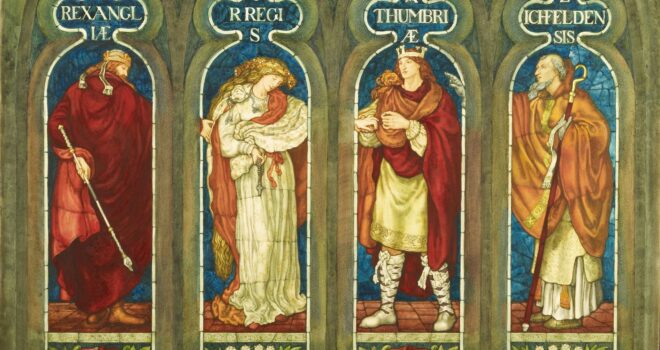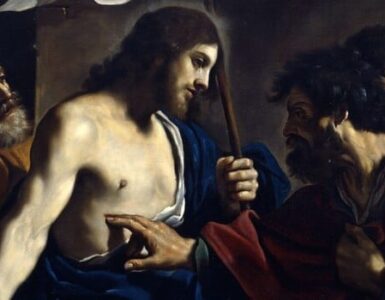Last year, I rewatched the ABC drama Once Upon a Time, which first aired from 2011 to 2018. It’s a strange but endearing show that puts a Disney-centric fairy tale aesthetic on a soap opera. Although I have many criticisms of the series, I still enjoy much of it.
On this rewatch, I realized that the show not only promotes (however ambiguously or imperfectly) Christian values like faith, hope, love, and forgiveness, but it also carries striking parallels to the salvation story, and even has an analogue to the Bible as a record of history and revelation. The format of the show, pairing a present-day storyline with flashbacks to a related storyline in the past, evokes the kind of foreshadowing and fulfilment discovered in biblical typology.
The show’s premise is that a host of fairy-tale characters have been cursed to forget who they are and transported to the modern-day town of Storybrooke, Maine. Time does not pass for them, so they remain frozen at the same age for 28 years. The protagonist of the series is Emma Swan, the long-lost daughter of Snow White and Prince Charming, who is prophesied to break the curse. However, Emma grows up as an orphan in the “land without magic,” and for a long time does not believe in the reality of the curse or her royal lineage. Throughout the series, she struggles with accepting her family, her identity, and her destiny.
This article will contain spoilers for Season 1 of Once Upon a Time (OUAT for short).
The Savior
From the very first episode, Emma is set up as a Christ-figure. Even before her birth, it is foretold that she will restore the happiness that her parents’ enemy, the Evil Queen Regina, is trying to destroy. Throughout the series’ flashbacks, multiple characters insist that Emma must find her parents and break the queen’s curse at the right time—in her case, when she turns 28—similar to how Jesus was incarnated and made His paschal sacrifice “in the fullness of time” (Galatians 4:4).
Emma is like Moses and Jesus in the way she escapes a tyrannical monarch who wants to kill her as an infant. Her parents place her in a wardrobe made from a magical tree that transports her to another realm (perhaps an homage to the wardrobe that leads to Narnia). While discussing this plan, one of the dwarves even says, “Our fate rests on a tree?” which calls to my mind the cross!
Snow White and Charming giving up years of time with their daughter reminds me of Jesus leaving the unity of the Trinity in Heaven to be incarnated on Earth. Snow White’s pain in letting go of her child resembles the sorrow of the Blessed Mother giving up her Son to God’s plan for salvation. Like St. Joseph protecting Jesus from King Herod’s soldiers, Charming protects Emma from the Evil Queen’s knights and ensures that she will grow up in safety.
Memory and Morality
A recurring theme across the books of the Bible is the importance of remembering. Throughout the Old Testament, God’s people repeatedly suffer because they fail to remember the great deeds He did for them in the past. The Jewish celebration of Passover commemorates the Israelites’ escape to freedom, and Jesus commanded His disciples to break bread in memory of Him; both rituals are considered a participation in those past events.
Memory—or more precisely the loss of memory—is also a central theme in OUAT. The fairy-tale characters have forgotten their true identities and lost their most important relationships. They are familiar with the classic stories, but they do not know that the stories are true, let alone about them. I find this similar to how many people are familiar with the stories of the Bible, but do not believe those events happened or understand that they themselves are part of the overall story.
Another noteworthy effect of the Dark Curse is that the heroes, once renowned for their integrity, no longer have a clear sense of right and wrong. In this moral murkiness, they make bad decisions, hurting themselves and each other. This is similar to the effect of Original Sin, clouding human judgment and corrupting relationships.
Under the curse, the residents of Storybrooke are trapped in mundane routine and mediocrity. They live in fearful obedience to Regina, the Evil Queen-turned-mayor. Their lives do not seem to hold any meaning. Everyone feels alone.
Henry, Emma’s ten-year-old son, comes onto the scene as a prophet, speaking the truth that no one believes and calling people back into a forgotten relationship. Growing up in Storybrooke as the adopted son of Regina, he possesses a book containing stories of the town’s inhabitants. Like the scriptures, it explains where the characters came from and where they must go. Henry is the only one who recognizes how the old stories connect with the people he knows, and he tries to make others realize it, though they dismiss his claims as childish imagination or delusion.
Emma is forced to reckon with her past when Henry, whom she placed for adoption at birth, tracks her down and convinces her to come to Storybrooke. Like John the Baptist, Henry prepares a way for the Savior and urges people to believe in them.
In the Fullness of Time
Without giving away details, the Season 1 finale is full of biblical imagery, mirroring the Harrowing of Hell and the battle between Christ and Satan. Ultimately, Emma breaks the curse, which restores the people’s memories. But they remain in Storybrooke, away from their homeland of the Enchanted Forest. They ask each other, if the curse has been broken, “Then why are we still here?”
This may have been how the early Christians felt, and may be relatable to the rest of us who live between the Resurrection and the Second Coming. Christ has conquered death and opened the gates of Heaven to us, but we still live under the effects of Original Sin on Earth. We must continue living here, holding onto our memory of the past and our hope for the future, until we reach our true home in Heaven at our death or the end of time.
Coming Home
Even after Emma comes to believe in the truth of the stories, it takes a while for her to open her heart to her parents and accept their story as her own.
We face a similar decision regarding our relationship with God and our place in the Communion of Saints. It is one thing to believe in God intellectually, but another to love and trust Him. We can choose whether to accept His invitation to a covenantal relationship, or run from it like the Prodigal Son.
Eventually—I will not say in what season—after years of running away from opportunities to have a home and meaningful relationships, Emma accepts Snow White and Charming as her parents, Henry as her son, and the people of Storybrooke as her friends. She embraces their values of faith, hope, and love, putting herself on the path to a happy ending.
Author’s Note: I plan to examine more aspects of Once Upon a Time on my blog and podcast, Finding Faith in Fandoms.
Photo by Birmingham Museums Trust on Unsplash










